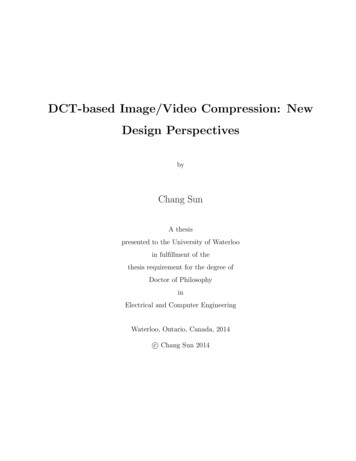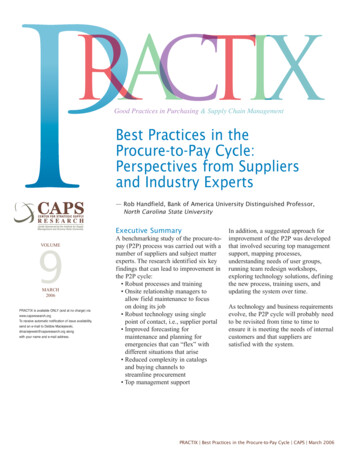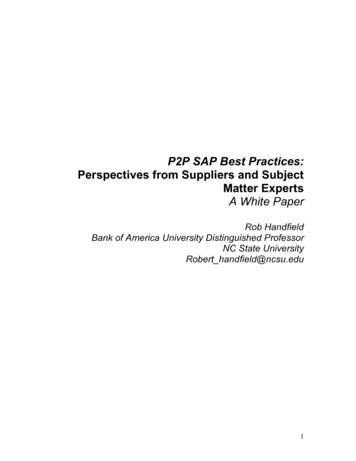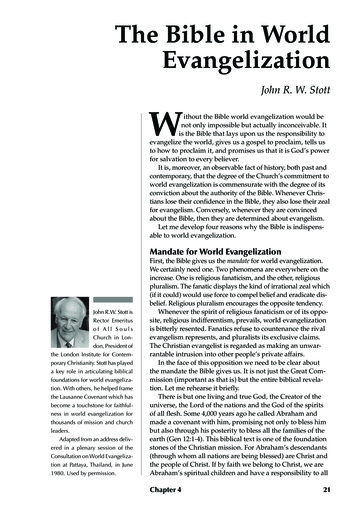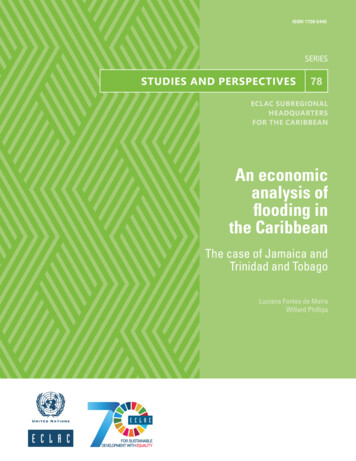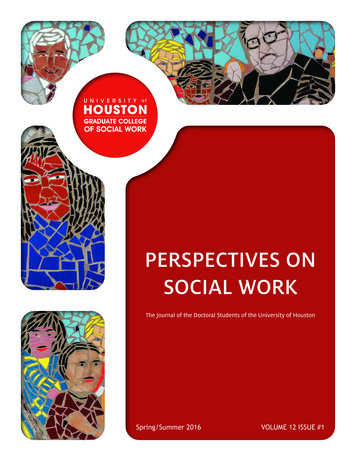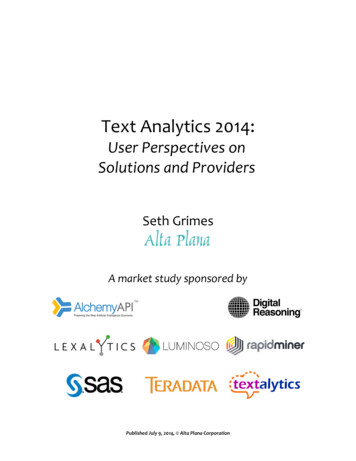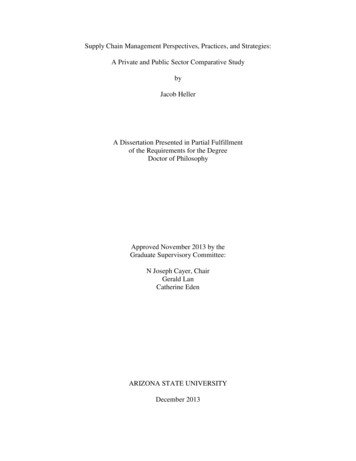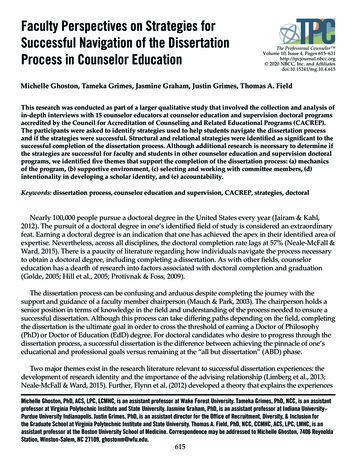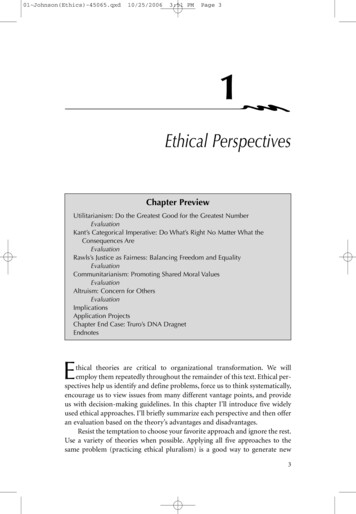
Transcription
01-Johnson(Ethics)-45065.qxd10/25/20063:51 PMPage 31Ethical PerspectivesChapter PreviewUtilitarianism: Do the Greatest Good for the Greatest NumberEvaluationKant’s Categorical Imperative: Do What’s Right No Matter What theConsequences AreEvaluationRawls’s Justice as Fairness: Balancing Freedom and EqualityEvaluationCommunitarianism: Promoting Shared Moral ValuesEvaluationAltruism: Concern for OthersEvaluationImplicationsApplication ProjectsChapter End Case: Truro’s DNA DragnetEndnotesEthical theories are critical to organizational transformation. We willemploy them repeatedly throughout the remainder of this text. Ethical perspectives help us identify and define problems, force us to think systematically,encourage us to view issues from many different vantage points, and provideus with decision-making guidelines. In this chapter I’ll introduce five widelyused ethical approaches. I’ll briefly summarize each perspective and then offeran evaluation based on the theory’s advantages and disadvantages.Resist the temptation to choose your favorite approach and ignore the rest.Use a variety of theories when possible. Applying all five approaches to thesame problem (practicing ethical pluralism) is a good way to generate new3
01-Johnson(Ethics)-45065.qxd10/25/20063:51 PMPage 44—LAYING AN ETHICAL FOUNDATIONinsights about the issue. You can discover the value of ethical pluralism byusing each theory to analyze the Chapter End Case (see Application Project 7on page 24). You may find that some perspectives are more suited to this problem than others. Combining insights from more than one theory might helpyou come up with a better solution. At the very least, drawing from several perspectives should give you more confidence in your choice and make you betterprepared to defend your conclusion.Utilitarianism: Do the Greatest Goodfor the Greatest NumberMany people weigh the advantages and disadvantages of alternatives whenmaking significant decisions. They create mental balance sheets listing thepluses and minuses of each course of action. When it’s a particularly importantchoice, such as deciding which job offer to take or where to earn a graduatedegree, they may commit their lists to paper to make it easier to identify therelative merits of their options.Utilitarianism is based on the premise that our ethical choices, like other typesof decisions, should be based on their consequences.1 English philosophers JeremyBentham (1748–1832) and John Stuart Mill (1806–1873) argued that the best decisions (1) generate the most benefits as compared to their disadvantages,and (2) benefit the largest number of people. In other words, Utilitarianism is attempting to dothe greatest good for the greatest number of people. Utility can be defined as what isbest in a specific case (Act Utilitarianism) or as what is generally preferred in mostcontexts (Rule Utilitarianism). We can decide, for example, that telling a specific lieis justified in one situation (to protect a trade secret) but, as a general rule, believethat lying is wrong because it causes more harm than good.Utilitarians consider both short- and long-term consequences whenmaking ethical determinations. If the immediate benefits of a decision don’toutweigh its possible future costs, this alternative is rejected. However, if theimmediate good is sure and the future good uncertain, decision makers generally select the option that produces the short-term benefit. Utilitarians arealso more concerned about the ratio of harm to evil than the absolute amountof happiness or unhappiness produced by a choice. In other words, a decisionthat produces a great amount of good but an equal amount of harm would berejected in favor of an alternative that produces a moderate amount of goodat very little cost. Further, the Utilitarian decision maker keeps her or his owninterests in mind but gives them no more weight than anyone else’s.Making a choice according to Utilitarian principles is a three-step process.First, identify all the possible courses of action. Second, estimate the direct aswell as indirect costs and benefits for each option. Finally, select the alternativethat produces the greatest amount of good based on the cost-benefit ratiosgenerated in step two. Government officials frequently follow this process
01-Johnson(Ethics)-45065.qxd10/25/20063:51 PMPage 5Ethical Perspectives—5when deciding whether or not to impose or loosen regulations. Take decisionsabout raising rural highway speed limits, for instance. States have the option ofmaintaining the 55 mile per hour limit or selecting from a range of higherspeeds. Raising speed limits produces immediate benefits—reduced travel anddelivery times. Fewer motorists are tempted to break the law. These benefits,however, must be weighed against the short-term cost of greater fuel consumption and the long-term risk of higher fatalities. After balancing the costsand benefits, a great many states have opted to loosen speed restrictions.EVALUATIONUtilitarianism is a popular approach to moral reasoning. We’re used toweighing the outcomes of all types of decisions, and the Utilitarian decisionmaking rule covers every conceivable type of choice. Few could argue with theultimate goal of evaluating consequences, which is to promote human welfareby maximizing benefits to as many people as possible. Utilitarianism is probably the most defensible approach in emergency situations, such as in the wakeof the massive earthquake that hit Pakistan in 2005. In the midst of such widespread devastation, medical personnel ought to give top priority to those whoare most likely to survive. It does little good to spend time with a terminalpatient while a person who would benefit from treatment dies.Despite its popularity, Utilitarianism suffers from serious deficiencies.2Sometimes identifying possible consequences can be difficult or impossible. Manydifferent groups may be affected, unforeseen consequences may develop, and soon. Even when consequences are clear, evaluating their relative merits can be challenging. Being objective is difficult because we humans tend to downplay longterm risks in favor of immediate rewards (see Box 1.1) and to favor ourselves whenmaking decisions. Due to the difficulty of identifying and evaluating potential costsand benefits, Utilitarian decision makers sometimes reach different conclusionswhen faced with the same dilemma. States have opted to raise highway speeds butthey don’t agree as to what the new limits should be. Some state legislatures determined that traveling at 65 miles per hour produces the greatest good; othersdecided that 70 or 75 miles per hour generates the most benefits.CASE STUDYBox 1.1 Stronger, Faster, Bigger:Sacrificing the Future for High PerformanceAthletes demonstrate how easy it is to ignore long-term consequences whenmaking choices. They are all too willing to sacrifice their futures for immediate
01-Johnson(Ethics)-45065.qxd10/25/20063:51 PMPage 66—LAYING AN ETHICAL FOUNDATIONresults. Baseball stars Ken Caminiti and Jose Canseco have admitted to takingsteroids. Competitors in a variety of other sports, including track, cricket, soccer,rugby, cycling, tennis, ice hockey, and orienteering, have been suspended for taking illegal performance drugs. In professional football, linemen are bulking up toland jobs. The number of players listed at over 300 pounds soared from 130 to350 between 1996 and 2004, and 70 percent of this group is made up of offensive linemen.The dangers of performance-enhancing drugs are well documented. Users ofanabolic steroids, which imitate the effects of testosterone, can experience moodswings; become hyperaggressive; suffer a higher likelihood of injury and liverdamage; and risk high blood pressure, heart disease, strokes, and blood clots.Males may also experience impotence, early onset of baldness, and breast development. Females may grow more body and facial hair and develop a deepervoice. Their breasts may shrink and menstrual problems may develop. Quittingcan also be dangerous. Those who stop taking the drugs face a drastic drop intestosterone levels, which can lead to severe depression and suicide among men.Ken Caminiti, the 1996 National League MVP, believed that his drug addictionproblem started with his use of steroids (he later died of an overdose).The dangers of drastic weight gain are just as real as those linked to steroids,though not as well publicized. All professional football players face a 90 percentchance of permanent physical injury if they compete for 3 years. However, therisk to massive linemen is even greater. A study conducted by The New EnglandJournal of Medicine found that the rate of sleep apnea among NFL players is fivetimes higher than among other males in the same age groups. Apnea victims suffer from repeated interruptions of breathing during sleep that can sometimesresult in an irregular heartbeat. Over time, sufferers are more likely to experiencehigh blood pressure and congestive heart failure. Apnea is believed to have contributed to the death of former pro-bowl defensive lineman Reggie White, whodied in his sleep at age 43. In addition to developing apnea, heavy players, likeother heavy Americans, are much more likely to develop diabetes and suffer fromstrokes.Why do athletes risk their reputations and lives to further their careers?Because the rewards for doing so are so great. Enhanced performance can literally mean millions of dollars in higher salaries and endorsement contracts, not tomention celebrity status. Steroid-enhanced performance can make baseball players into highly sought after free agents. Bulking up allows football players to earnfortunes while playing the sport they love in front of adoring fans. Then, too, it’seasy to discount future risks by rationalizing that “it won’t happen to me” or toargue that the dangers don’t outweigh the immediate payoffs. After all, earning asubstantially higher salary now can guarantee a comfortable (if not luxurious)lifestyle for an athlete and his or her family after retirement. The trade-offs—ashorter life span, serious health problems, and chronic pain—appear to be worththe risk.
01-Johnson(Ethics)-45065.qxd10/25/20063:51 PMPage 7Ethical Perspectives—7Professional athletes may seem shortsighted. Nevertheless, millions of average citizens also mortgage their futures in order to reach their career goals. Theywork 80-hour weeks, eat unhealthy food, deprive themselves of sleep, ignoretheir families, and endure high stress levels in order to earn more money and toget promoted. The sacrifices may be worth it, but few conduct the rational costbenefit analysis required to determine what will generate the greatest good inthe long run.DISCUSSION PROBES1. Imagine that you are a professional athlete in your favorite sport. How far wouldyou go to improve your performance?2. Athletes use a variety of tactics to boost their performance (training at high altitudes or in oxygen deprivation chambers, going on special diets and training regimens). Where do you draw the line between ethical and unethical tactics? Whatcriteria do you use to make this determination?3. Do you hold fans partly responsible for the poor health choices of athletes? Whyor why not?4. What steps can you take to better balance long-term consequences against shortterm rewards when making ethical choices?SOURCESAdler, A., Underwood, A., Scelfo, J., Juarez, V., Johnson, D., Shenfeld, H., Reno, J., Murr, A.,Breslau, K., & Raymond, J. (2004, December 20). Toxic strength. Newsweek,pp. 44–52.Ever farther, ever faster, ever higher? (2004, August 7). Economist, pp. 20–22.Hiestand, M., & Mihoces, G. (2004, December 29). Apnea common for NFL linemen. USAToday, p. 1C.Saraceno, J. (2004, December 29). White’s death sends message to super-sized NFL. USAToday, p. 12C.Starr, M. (2004, August 16). A long jump. Newsweek, pp. 52–53.Ironically, one of the greatest strengths of Utilitarian theory—its concernfor collective human welfare—is also one of its greatest weaknesses. In focusingon what’s best for the group as a whole, Utilitarianism discounts the worth ofthe individual. The needs of the person are subjugated to the needs of thegroup or organization. This type of reasoning can justify all kinds of abuse. Forexample, a number of lawsuits accuse Wal-Mart of cheating individual employees out of overtime pay to cut labor costs for the greater good of the company.3
01-Johnson(Ethics)-45065.qxd10/25/20063:51 PMPage 88—LAYING AN ETHICAL FOUNDATIONKant’s Categorical Imperative: Do What’s RightNo Matter What the Consequences AreLike the Utilitarians, German philosopher Immanual Kant (1724–1804) developed a simple set of rules that could be applied to every type of ethicaldecision. However, he reached a very different conclusion about what thoseprinciples should be. Kant argued that moral duties or imperatives arecategorical—they should be obeyed without exception. Individuals should dowhat is morally right no matter what the consequences are.4 His approach tomoral reasoning falls under the category of deontological ethics. Deontologicalethicists argue that we ought to make choices based on our duty to follow universal truths, which we sense intuitively or identify through reason (deon is theGreek word for duty). Moral acts arise out of our will or intention to followour duty, not in response to circumstances. Based on this criterion, an electricutility that is forced into reducing its rates is not acting morally; a utility thatthat lowers its rates to help its customers is.According to Kant,“what is right for one is right for all.” We need to ask ourselves one question: Would I want everyone else to make the decision I did? If theanswer is yes, the choice is justified. If the answer is no, the decision is wrong.Based on this reasoning, certain behaviors, like honoring our commitments and being kind, are always right. Other acts, like cheating and murder,are always wrong. Ka
mention celebrity status. Steroid-enhanced performance can make baseball play-ers into highly sought after free agents. Bulking up allows football players to earn fortunes while playing the sport they love in front of adoring fans. Then, too, it’s easy to discount future risks by rationalizing that “it won’t happen to me” or to argue that the dangers don’t outweigh the immediate .
